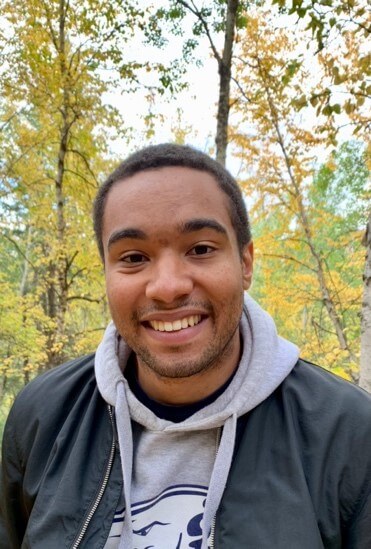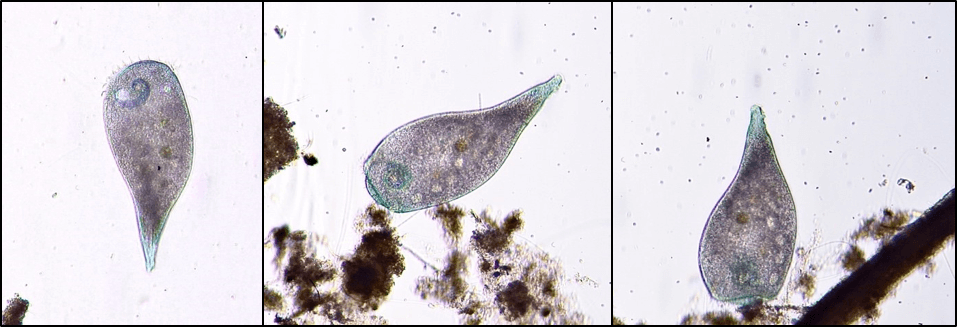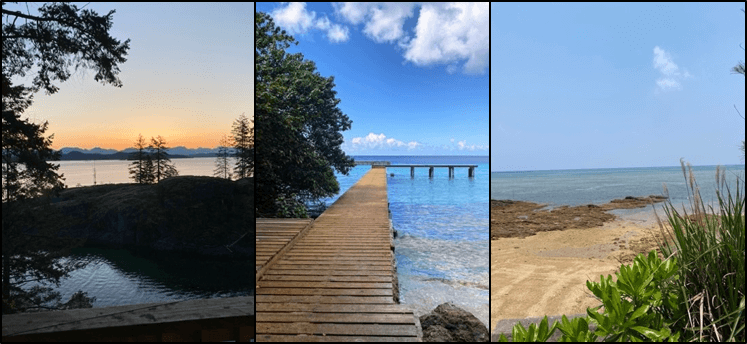 Hi, I’m Mahara and I was born and raised in Comox, BC, on Vancouver Island. I earned my undergraduate degree at UBC in Biology, and I am currently working on my PhD in the Keeling lab, where I study a group of protists called Apicomplexa. These are obligate parasites, best known for including Plasmodium is the causative agent of malaria, and Toxoplasma,the causative agent of toxoplasmosis. Across the broader group, there is a variety of different mitochondrial metabolism types, and I’m particularly interested in how these evolved. I’ve TA’d BIOL 203, Eukarotic Microbiology.
Hi, I’m Mahara and I was born and raised in Comox, BC, on Vancouver Island. I earned my undergraduate degree at UBC in Biology, and I am currently working on my PhD in the Keeling lab, where I study a group of protists called Apicomplexa. These are obligate parasites, best known for including Plasmodium is the causative agent of malaria, and Toxoplasma,the causative agent of toxoplasmosis. Across the broader group, there is a variety of different mitochondrial metabolism types, and I’m particularly interested in how these evolved. I’ve TA’d BIOL 203, Eukarotic Microbiology.
What do you most enjoy about being a TA?
My favorite part of being a TA is conveying the joy and wonder that I find in observing the natural world to students. Since I was little, I’ve loved being outside and in nature, but through university I experienced a bit of a dip in my love of science, as I got a bit absorbed in the nitty gritty of getting the marks and grinding for classes. But there’s been a few experiences that have brought that back out and passing that on to students that may be suffering in the minutia of getting through courses really motivates me. I find seeing a spark of interest or a student that is amazed at looking through a microscope to be very meaningful.

What has being a TA brought to your graduate studies experience?
Despite some cool fieldwork, travel, and topics that I really enjoy, it can be easy to get bogged down in the specificity of the field that you’re working in and in reading papers and writing and doing your experiments in the lab. But taking a step back, remembering my time as an undergrad and trying to bring some engaging learning to other students really makes me remember why I love science.
How has your unique background influenced your TA experience?
Both of my parents are high school teachers, and I can remember so many instances as a kid when they were teaching me, either about academic stuff or just about the world around me. For example, my mom would often come home with a microscope set, a chemistry demo, or a model of the solar system, and my dad would show me funky geometrical patterns, and got me making patterns with copper wire. As I’ve grown as a student and a teacher, these experiences stand out as moments that have really resonated with me as learning, and as my perspective has changed, teaching moments. I try to capture that sense of awe and amazement and convey it to students in my own teaching by using the techniques that they used, either inadvertently or intentionally, while teaching me cool things.
What opportunities relating to teaching and learning have you been a part of?
Last year I completed the Instructional Skills Workshop (ISW) through CTLT, and that was really eye-opening to me. Growing up, I went to swimming lessons and I swam competitively a little bit, and then I became a swimming instructor and a lifeguard. After a while, I got certified to train lifeguards, and that involved a lot of course planning and classroom management so I gained a lot of teaching experience through that, and that’s honestly what I’ve been drawing on the most through my TAing experience. I did that for five years or so, and that makes up of the bulk of my teaching experience, but it’s nice to apply it to the field that I spent so much of my life pursuing.
What’s something you’re currently doing at UBC that you’re excited about?
I have a guest lecture coming up that I’m really excited for in BIOL 111. It’s the first time I really got to design a whole lecture about protists with very few restrictions.
On the lab side of things, I’m doing electron microscopy and processing sequences from samples from fieldwork in Quadra Island, Curaçao and Okinawa. Fieldwork is my favourite aspect of my research, and it is always very rewarding to watch the resulting dataset take shape.

What is a memorable anecdote from your own undergraduate experience?
When I started at UBC I was in the Science One program, and the first biology midterm that we had went awfully. I think the class average was 32 or something like that, and I remember everybody being super depressed about that, myself included. I remember doing well worse than the average. After that, I was kind of freaked out because I hadn’t struggled with school until then, so I really, really studied for the subsequent midterms. I remember after one of the midterms later in the year, everybody after was panicking about what our mark were going to be. When we got the marks back, mine wasn’t the best, but it was a solid mark for me, and I wasn’t unhappy. I remember one of the profs pulling me aside and saying something along the lines of “you did pretty well on this one, biology could be something that you’re good at.” And maybe for them, that wasn’t a big moment, but for me, the fact that they singled me out and believed that this is something that I could pursue, that was the first spark that made me go in that direction.
The second spark that really inspired me to go into biology was after taking BIOL 203 Eukaryotic Microbiology. The professor, who is now my supervisor, approached me and said that the teaching team had noticed the way that I was working in the labs, and would I be interested in pursuing a research experience in the lab? This hit me out of nowhere, I wasn’t expecting it, and it reconnected me with the idea that, oh, I could actually do this. I did an undergrad placement in the lab and I loved it, so I come back to pursue graduate school in this lab. Those are probably the two moments that stick out to me in my undergraduate experience that have really shaped the direction of my scientific journey.
What do you like to do in your spare time?
I love to cook, I love to garden, I love playing and writing music, and I love beach walks with my girlfriend.
What is a fun fact about you that people may not know?
I’m really into jewelry making. I make copper jewelry with wire weaving, and I do some chain link jewelry. I try and use reclaimed copper wire from electrical fittings and such. Come buy some jewelry at the Botany Huts auction next year!
What are your plans following graduation?
I’m still trying to figure that out for myself. I know that I absolutely want to do university teaching in some capacity, whether that’s a professorship or a lecture position. I’m still exploring the different pathways that are possible there. I’m, of course, very into research. I love research, and so incorporating research and lecturing in a professorship or in some other capacity would be my ideal. But I’m still exploring, and we’ll see where that takes me.